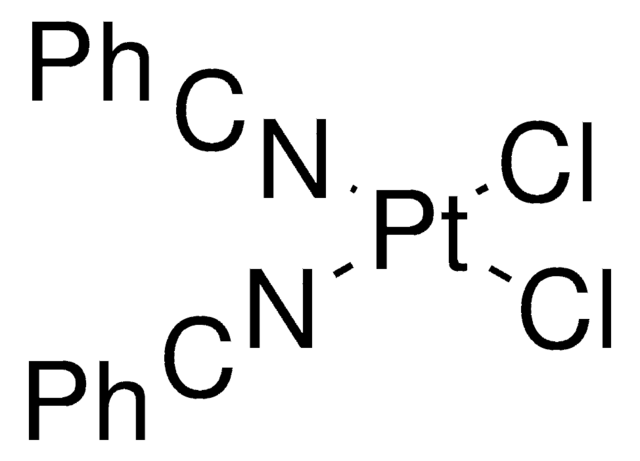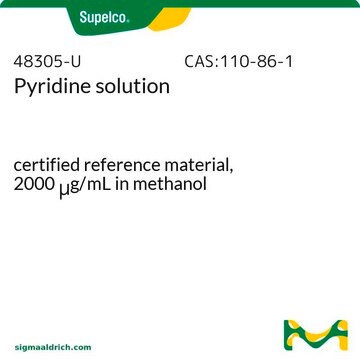About This Item
Recommended Products
vapor density
2.72 (vs air)
Quality Level
vapor pressure
10 mmHg ( 13.2 °C)
20 mmHg ( 25 °C)
product line
ReagentPlus®
Assay
≥99%
form
liquid
autoignition temp.
899 °F
expl. lim.
12.4 %
impurities
≤0.1% water (Karl Fischer)
refractive index
n20/D 1.509 (lit.)
pH
8.5 (25 °C, 15.82 g/L)
bp
115 °C (lit.)
mp
−42 °C (lit.)
density
0.978 g/mL at 25 °C (lit.)
SMILES string
C1=CN=CC=C1
InChI
1S/C5H5N/c1-2-4-6-5-3-1/h1-5H
InChI key
JUJWROOIHBZHMG-UHFFFAOYSA-N
Looking for similar products? Visit Product Comparison Guide
General description
Application
- To synthesize glycophospholipids and phosphate diesters or phosphonate monoesters in the presence of trichloroacetonitrile as an activating reagent.
- In Knoevenagel condensation reactions.
- In the TEMPO-mediated radical polymerization of 3-vinylpyridine.
Legal Information
Signal Word
Danger
Hazard Statements
Precautionary Statements
Hazard Classifications
Acute Tox. 4 Dermal - Acute Tox. 4 Inhalation - Acute Tox. 4 Oral - Eye Irrit. 2 - Flam. Liq. 2 - Skin Irrit. 2
Storage Class Code
3 - Flammable liquids
WGK
WGK 2
Flash Point(F)
68.0 °F - closed cup
Flash Point(C)
20 °C - closed cup
Certificates of Analysis (COA)
Search for Certificates of Analysis (COA) by entering the products Lot/Batch Number. Lot and Batch Numbers can be found on a product’s label following the words ‘Lot’ or ‘Batch’.
Already Own This Product?
Find documentation for the products that you have recently purchased in the Document Library.
Customers Also Viewed
Our team of scientists has experience in all areas of research including Life Science, Material Science, Chemical Synthesis, Chromatography, Analytical and many others.
Contact Technical Service











